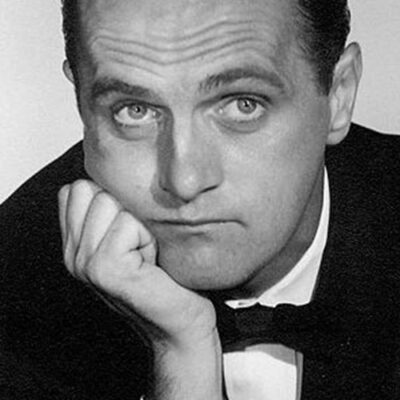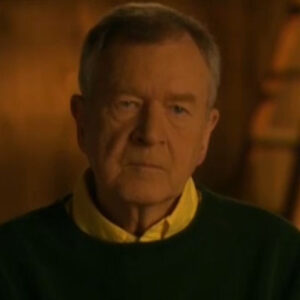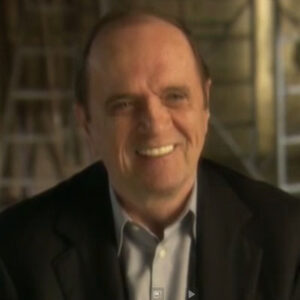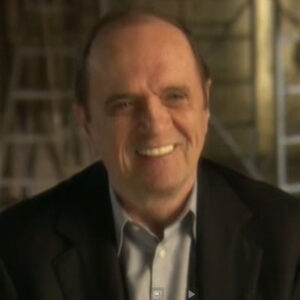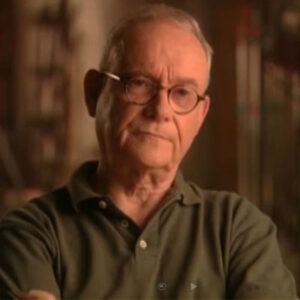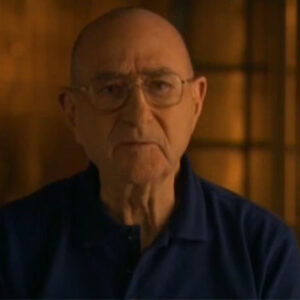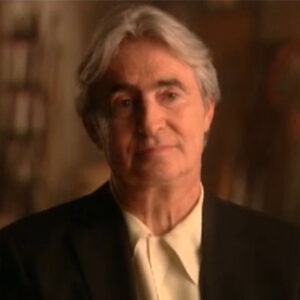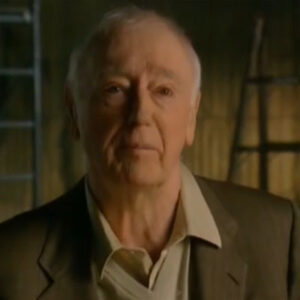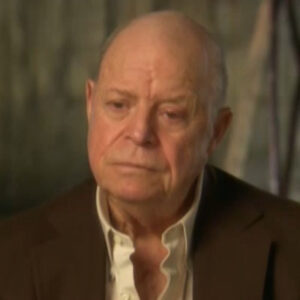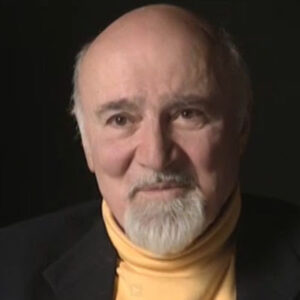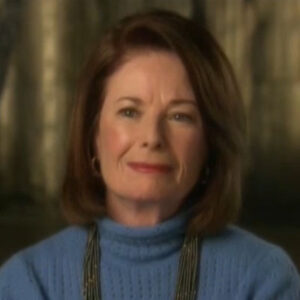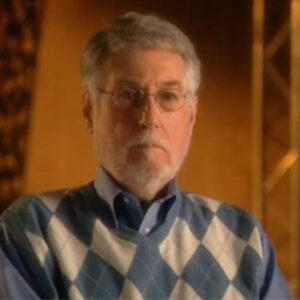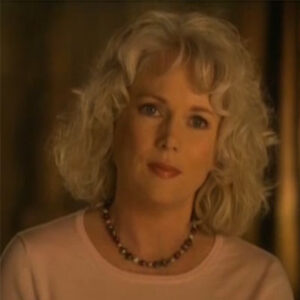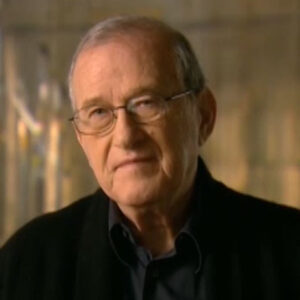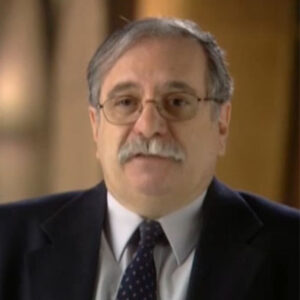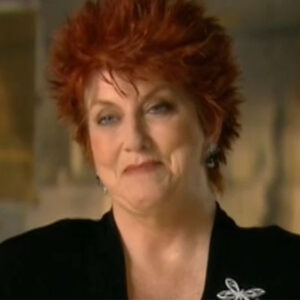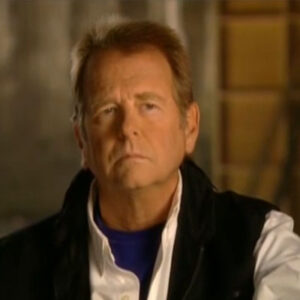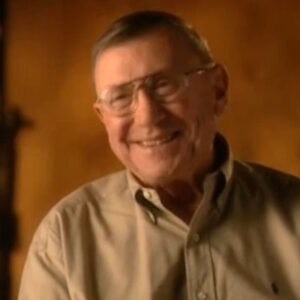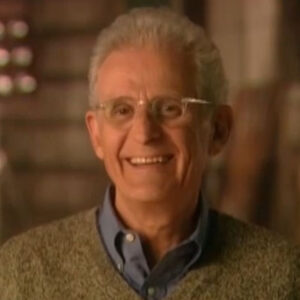Interviewer: I just want to ask you first how familiar you were with Bob’s work before the show and before you worked with him, what you knew about it.
David Davis: OK.
Interviewer: Are you familiar mostly with his albums or were you a fan of his even before the show or.
David Davis: When it when I used to work down in the studios. When I first started out, I when I would drive to work. I would listen on the radio to a local disc jockey, think his name was Bob Crane and he used to play early in the morning, used to play comedy albums, and he’d play all different kinds of comedy albums, Shelley Berman and all that. At that time it was like nineteen fifty nine, 1960. And I’m driving to work and I hear Bob Newhart to the bus driver sketch. And it was just it was magic. And I remember driving in to work, pulling into my parking space and just sitting there listening to this hilarious piece of work. And just being just awed by it. And every morning we listen to the same program and they would play it. Sir Walter Raleigh face the double day and the baseball. And it was like such a thing to look forward to driving to work. Just listening to Bob. So that was how I first started to. That’s how I became acquainted with Bob Newhart.
Interviewer: And what was it about him? Was it something. Was it something you hadn’t heard before? Was it unique or what was it about?
David Davis: I think. What was unique about Bob listening to him on the radio like that is that his delivery was so perfect and his subject matter was so clean and things that you could identify with. And he always was very polite on honest on his records. He wasn’t mean spirited. He was loud. He was just talking and just doing his routines. And and the material was was just really bright and original.
Interviewer: He said he wasn’t that different, not necessarily from the showy Burmans.
David Davis: But, you know, he wasn’t loud. He wasn’t yelling. He wasn’t one of those kind of comedians. He was just the monologist that did. Very, very interesting material, which I understood later that he wrote. And And that was was was why I enjoyed listening to him and so did everybody else.
Interviewer: So did you sort of that’s what kept in the back of your mind later on, that this would be somebody might want to work with?
David Davis: Not really, because we were so far apart in those years. I mean, I was I was started out as a as a director on The Daily Show, working my way up into that. I wanted to direct. I wasn’t necessarily wanting to write, even though I did a little bit of it. And I just followed Bob because he was doing. I know the nightclub business and his albums and things like that. So it really it didn’t quite come together. For Bob Newhart and myself, until my partner at that time, Lorenzo Music. Well, I’ll start that again. Why don’t we keep going on something else? Just for a minute.
Interviewer: Actually, I was just gonna ask. Yeah. How you and Lorenzo first came to the idea of doing something with Bob and the origins of that. Yeah.
David Davis: Well, I started riding with Jerry. Music at that time was his name before he changed it to Lorenzo. And we were moonlighting, writing love, American style and. He had a great voice for Bob. And. He he had his idiom because Lorenzo used to perform. And so he he worked with the Smothers Brothers and he new lifestyle. In fact, when he was at the Smothers Brothers with his partner at that time, Carl Gottlieb, they wrote one of Bob’s. Great routines, which was the air traffic controllers routine. For when they were on the Smothers Brothers show. So when Lorenzo left the Smothers Brothers and went over to Glen Campbell. I happened to be available at that time, so I went over to Glen Campbell with Lorenzo. And at that time, Bob became a guest on that. Glen Campbell Goodtime Hour. So we had to write a sketch for Bob. So I got involved with writing for Bob with Lorenzo at that time. And we wrote a sketch for Bob. And it was okay. And they did it. And that was fine and all that. And at that time, I was associate producer and get smart. And I went back to get smart. Lorenzo moved on to the less we are going to show. And we started to write at night. Television shows. And at that time, all of American style was an anthology show, and it was very easy to write little short pieces for that show. So we figured, well, let’s try doing that. We might have a chance of selling it and then become like a team. So we spent the weekend and Sunday and went to the park and we wrote a sketch for Bob Newhart for Love American style. And it was you like it was incredible. Little sketchy was almost like a single character that a guy wakes up in a hotel room with a strange woman and in bed with him and he’s trying to figure out what happened. He was drunk and he couldn’t figure out. And he got married. And it was like the character was on the phone, which is what Bob did. That was his signature. And we sold that. It was like an eight minute piece. We sold it and we said we wrote this for Bob Newhart. And so they said, great. And they sent it out to him. And he wasn’t available. He was out on the road. He did something. So they cast Sid Caesar. Caesar in it. Who did you did the lines exactly the way we wrote for Bob. So he said, wow, that’s pretty amazing. So we ended up writing more than one American Styles’s and stuff like that. I forgot what the question was, but. Well, I can keep moving on.
Interviewer: I just want to go back to one thing, if I could, which is you mention the sketch. Oh, yeah. Remember what it was?
David Davis: Not really. Except I think Bob was in overalls and had kept the neckerchief around his neck. I don’t I don’t remember exactly what that was. It was a funny visual. That’s right. But I just got to kind of ramble, ramble a little bit. When I did. OK. After the get smart business wouldn’t get smart, went off the air. I teamed up with Jim Brooks and Allen Burns to do Mary Tyler Moore Show. And that was a huge. Change in my in my career and my life. When I went over there, I became producer Lorenzo and I. At that time had written three other love American styles and that’s it. And he was available. I became the line producer of Mary Tyler Moore, and he became just a staff writer. And we had we were good to write because we wrote these love American styles. We were going to write for Mary Tyler Moore. So so we started writing for Mary Tyler Moore. It’s the first time we ever wrote more than a eight minute piece of writing. It was not easy, but we ended up doing one and then the second one. We. We did. We said what’s right? Let’s let’s let’s write. Mary Tyler Moore for Bob Newhart. Because we we knew his work and and things like that. And so we wrote this Mary Tyler Moore Show, especially for Bob Newhart, where Mary gets audited on her income tax. And the auditor is Bob Newhart. He comes and he’s auditing her and he falls in love with her and he won’t. And the audit. And that was and she has to break it off. But she doesn’t want to because he’s the IRS. And. And we wrote this script and it was really we were very proud of that script. And Bob’s manager was also Mary’s manager, Arthur Price. And so we had the script and we said, can you get this to Bob? Because we wrote it for him. And again, script with Bob said, good script and everything. But he wasn’t available. He wasn’t you know, he was out on the road. He was doing something. So we cast Paul Sand. Now, Paul Sand and Bob Newhart are like two different sides of the coin. I mean, it was, you know, just completely different types. And yet, Paul Sand doing those same lines. It worked incredibly. So without changing any lines. So for some reason, the way we wrote it, it worked great for Bob Newhart, also worked great for other other actors. We were kind of amazed by that. So I think so. At the end of the second, during the second season of Mary. We were story editors. I was still producing. We were now story editors and we had a deal to write a pilot. Now, because Mary Tyler Moore is such a big hit and we had written for Mary’s script, so we were kind of known as a writing team as well as somewhat of a producing team and not quite. They said you could you know, you could. You could write a pilot. So we said for CBS, we said great. So we went into a meeting with CBS Development, which was Alan Wagner. And Steve Gentry was in the room with Alan Wagner. And we went in for the meeting. And Alan Wagner said, So, guys, you know, you’re doing great work on the bar, on The Mary Tyler Moore Show. Do you have any ideas to do a pilot and we said, you know, we have absolutely no idea whatsoever. And he said, you know, I like that. He says, because just being honest with us, he said, why don’t you go back and think of what you want to do? And we say, well, we well, we’ll let you know. So we went back and we said, you know. I don’t know. We don’t know what we want to do as far as what kind of show he wanted to, but all we know is that we. Right. Great for Bob Newhart. So let’s just right a show for Bob Newhart, just a half hour situation comedy for Bob Newhart. So we went and we say, OK, what kind of show do you want to do? And. We kind of thought about it. Yeah. Okay, well, how do you do a different show? A good show. As the Mary Tyler Moore was good in that same MTM style. For Bob. And so we kind of thought of, you know, different areas and we thought, well, you know, maybe a grade school principal thought about that. Maybe he’s in the Army. And it just kind of came to us of going through all the different. Occupations and vocations and all that. And since I was in heavy duty therapy at the time, we thought, let’s make him a psychologist. And we made him a psychologist because Bob listens funny. And he’s a reactive. He’s he’s he’s he’s he’s a he’s a terrific reactive comedian. Plus, he’s he’s a great actor. On top of all that. But the key to the show, believe it or not, was that we wanted to give him a life at home. We wanted to do a show like The Mary Tyler Moore Show, where he lives and where he works. And and we thought, okay, we didn’t want we knew what we did not want to do. We did not want to do a show with kids. We did not want to do a show with kids. We did not want to do a show with dogs and pets like the old situation comedies of all. We want to do something somewhat different. And we thought, you know, Bob is at that time, he’s like in his 40s. Why don’t we have him married? But it’s a young marriage. It’s a new marriage. It’s a first marriage for both of them. And so you could do a show about marriage using like young married problems, but with mature people. And that, I think, is the key to the success of this show because he had a great life at home. Not just a funny psychiatrist or psychologist, as we call them. But he he he had a terrific marriage and very interesting marriage because they both were very strong willed people. And they they discuss things. And him being a psychologist. He was able to talk about his feelings and and also ask her when she would talk about her feelings. We did a show with the whole show was about. They made a vow when they were married. Don’t go to bed mad. And they ended up. There was a fight about Monday Night Football and it was enough for her. Saturday, Sunday football, Monday Night Football. And so they ended up pulling out the vow and she didn’t want to pull out the vows. I’m not mad. She says, well, you know, you’re mad. No, I’m not mad. And then she takes a cream pie and flips. It is his lap. And. And then he says, Now I’m mad. And then they’re up all night talking about what is what is their problem. And she doesn’t want him to give up her Monday nights for football anyway. There were things in that show where he said she’s he said to her, you know, he was very understanding about her. And she said, you know, that’s the problem with you, Bob. You don’t yell. And he says, you know, you just want me to. Yeah, well, he said, well, let’s go right down what’s bothering us on paper? And then we can yell on paper. That kind of rapport back and forth was very different on the show. Yeah, go ahead.
Interviewer: Do you think it was more adult comedy as opposed to what else was on TV?
David Davis: Well, can we get back to that? Because I just want to finish this one when one thing about about the Alan Wagner and all that. OK, so. So we so so. So we wrote the show and. And. See? How do I get back into this?
Interviewer: About the reaction?
David Davis: Well, actually, what would happen is that so? So. Oh yeah. So. And we also it was what I what I said was what we don’t want to do. That’s it. And so we didn’t want to no children. We didn’t want no pets. But we wanted this young marriage with mature people. And also I wanted to give her a job. So she wasn’t just a housewife waiting for him to come home. But we also wanted her to be available for the stories it when he was involved with things. So we made her substitute schoolteacher and that kind of gave her a profession when needed. So sometimes that would get in the way of his things. His stuff would get in the way of her things that gave him some kind of a of of a discussion or an argument, whatever it would be. And we we we. So so we did that. And also in the pilot script, too, to excuse the fact that they had no children in our pilot script, we decided the story of the pilot would be that she wants to have a baby. That they are trying to get pregnant. And now was is that was that was somewhat bold for our pilot script, mainly because we felt that the pilot script should be it’s not a premise. Pilot them getting married. It’s as it’s a story that stands by itself. And it’s also indicates something that needed to be addressed is why didn’t they have kids? So they’re so he is they’re trying to get pregnant, which is very funny. It’s a very opening scene, which she’s getting her temperature and she’s ready and he’s gotta go to work and knock on the door. Stuff like that. So we we ended up addressing that and then, you know, she couldn’t have a baby they were going to adopt. And then we just drop that. Which is fine because we didn’t want any kids in the show. Then what we did. There’s a finish and then. So we wrote the script. And we made Bob a psychologist and we use Chicago because he he came from Chicago, so we made Chicago and we always say we use Chicago because Minneapolis was taken. And Chicago does the seasons. We wanted seasons because most of the sitcoms these days, they’re always wearing short sleeved shirts and it’s always summertime. It’s never anything except Christmas when everybody is wearing scarves and hats. So we wanted to show seasons because it always is interesting that somebody comes into our room, take off a coat, hang it up, and it gives you an area to play. And you see it on Mary show and you see it on the early Newhart shows as well. So we gave it to in Chicago and and we wrote the script. But before well, before we wrote the script, we wrote a presentation because we had to allow Ann Wagner. We were going to do a presentation to show him what we wanted to do. So we sent in a presentation with about 14 pages. Kind of giving you the idea with dialogue. Well, we wanted to do. And I got a call from a CBS executive after they read it. And they said, oh, we read your presentation. It’s great. It’s it’s really it sounds like, Bob, it’s terrific. I really like the show. He said. I just have two caveats. And we were both on the phone, too, in the same office. And we looked at each other like, you know, what’s a caveat? We didn’t even know what that word was at that time. And he said, you have to cover it. We found out later. You know, he had to copy it. And we found out later. He said, I just have two caveats. He said, OK. He said, does he have to live in a condominium? And does he have to be a psychologist? And it was like, wow. Yes. The condominium you can have but and working at an empty home. It was like the most amazing experience because the writers had total creative control. So we made him a psychologist. I think at the time they were concerned about him being a psychologist at the time, I think that was that was considered to be avant garde. I don’t know. You know, there was a time when you couldn’t say crazy on television in the 60s, couldn’t say funny farm. You couldn’t make fun of the mentally. So they didn’t want to commis psychologists, in fact, in our pilot that we shot. They said, can you call a personal counselor? So it was there. Yeah. So it was personal counselor was in the pilot and then after we sold the pilot, we. Change the door and it said psychologist. And we wanted a psychologist, not a psychiatrist, because a psychologist is not quite so, you know, formal.
Interviewer: Bob also said to agree to some things that he wanted to hear. He also says, you know.
David Davis: No what happened then. Is that we went and we wrote the script and we wrote the script. On weekends over the summer. And because we were doing The Mary Tyler Moore Show at that time and so on weekends, we were writing the script. And in actuality and this is the original pilot. He he his partner, Jerry Robinson, was also a psychologist only. He was a much more vocal and more current, our current type of psychologist. Bob was pretty down the middle of the road. Jerry was without their. So it’s spread. We changed that after the pilot was so I can explain that later to you. But we went on the weekends, we wrote the script, we wrote the script, and we told Arthur Price that we’re writing a show for Bob Newhart. And he said, great, you know, I’ll show it to him when you’re finished. And so we it took us through the entire summer to get that script ready because of the weekend’s riding and on weekends and wanting to get it right. And I think we finished at around September, something like that, through the whole summer. And and we even got the coverts at the Bob Newhart Show. And we sent the script to CBS. And they read the script and they said we liked the script. And they said, can you get Bob Newhart? And we said, we don’t know. I said. But if we can’t, we’ll we’ll get somebody else to play. Bob Newhart in the bottom do art show consider work before. And this is the show he wanted to write. We want to write that marriage in want to. Right. Bob is a psychologist. A psychologist. And so then we gave the script to Arthur Price and Arthur Price delivered the script to Bob. And that was it.
Interviewer: And what was his reaction?
David Davis: I’ll do it. There was no discussion at all.
Interviewer: So can you say, Bob, that when Bob.
David Davis: Bob read the script and he said, I’ll do it. That’s it. There was no input. He agreed with what we did. That’s what we do. It wasn’t like he was he he never read the presentation.
Interviewer: What do you think it was that he had said no to so many other things that he would send to the guarantee? What was it about this?
David Davis: I think the timing was right for Bob at that time. I think he was tired of going on the road. I think he wanted to be with his family. I think you want to play golf. I think it was time for him to settle into L.A. and do a series. And the fact that it was MTM and the fact that he knew Lorenzo, I think helped and and. And the company was, you know, starting out. This was the first MTM project. Other than The Mary Tyler Moore Show.
Interviewer: What made you think, is he here? Here he was really up until that time, primarily I’m a comedian. And what made you feel so certain that he would work as start having a whole sitcom based around?
David Davis: I don’t I don’t think that was ever a doubt in anybody’s mind. And I understood he really did a show in the past, which I wasn’t even aware of, that he won an award for. It wasn’t even a doubt in anybody’s mind that that that that he could he could do it show.
Interviewer: Because his earlier show had been like a variety show. So I just wonder if, you know, here he was coming in more as an actor as opposed to a comedian. Did you see any kind of learning curve for.
David Davis: He just. No, no, no, no. I didn’t know. I don’t know what Bob’s back story as an actor was. I know what is. You know. There was never a doubt in our mind that this wasn’t Bob Newhart talking when we were writing this script. There was never a doubt in anybody’s mind.
Interviewer: And why don’t we take break? We said his name a couple. Now, while there, maybe you can just say Lorenzo. I.
David Davis: That’s not easy. All rights won awards.
Interviewer: So let’s talk a little bit about the pilot. What was it was different than the than the show turned out to be.
David Davis: OK. The pilot for The Bob Newhart Show, as we wrote it. What was great? It was a great experience. Believe it or not, for pilots, the script was pretty much the way we wrote it. Well, OK, I’ll go and I’ll go into the pilot, OK? All right. We had the pilot script. And the routine at the at the MTM routine was that. You would you would you would read the script and then you would hear the script. And when you do what you want, go into casting or any of that, right.
Interviewer: But I just was what you said already about the Jerry was also a psychologist, that there were some other differences as well.
David Davis: Yeah, OK.
Interviewer: You just say the pilot wasn’t what was Bob was also for the managers.
David Davis: No. OK. So so. So it was time to shoot the pilot. And what we did in at MTM was that you would sit around a table, read the script here at. Jay Sandras was a director for the pilot. He would take take the actors down to the stage. We would start rewriting, punching it up, so to speak, which is the word I don’t like to use changing things and making things a little clearer and story wise and stuff like that. And then we would rehearse it for about three or four days. And what we would do then, because Bob is so great with an audience, is that we would bring in an audience without any cameras whatsoever and play this show for the audience and record the laughs in here and then play back the reaction to the cast. And which we did now along those three, four days of rehearsals. We would have dress rehearsals, we would have it is five days. We have dress rehearsals. We would have we would bring in Alan Burns and Jim Brooks would come down for Mary Tyler Moore and and watch our run through and give us notes. And we, you know, help us in that respect. We always had, you know, people coming up with ideas, but it’s mainly Lorenzo and myself. And then after that first dry audience response, we knew that the show worked. And we play the laughs back for, you know, for the cast. And it was a great time. And then so we shot the show and and the show is was worked out real well. We were real pleased with it. Audience liked it. Bob is great with an audience. And that’s another reason why this show works so well, because he respects the audience so much. And he he comes out in front before the show starts and he takes the microphone. We have a warm up man, which was Lorenzo is our war man. We have a band playing to keep the audience occupied in between takes and in between scenes, I should say. And but, Bob, we wouldn’t introduce the. I would take the microphone and just do a wonderful routine for the audience, just welcoming them and talking to him and immediately becoming endearing to the to the to the audience. And then he would hand a microphone to Lorenzo, the warm up man. Then and then he was all business. I mean, he was completely, totally all business. He he he would not work to the audience other than as the character of Bob Hartley. And and he was always there on time. He was always into the work and he was always on his lines. He was amazing in that way.
Interviewer: How important was the live audience for him?
David Davis: There was the live audience for Bob and our show was everything. I never sweeten the laughs everyth on the laughs that we got were real. They all say that, but that’s not quite true. But with ours it was. I was very much involved with with keeping that audience alive. And and and then part of the show and the actors were on hold for the laughs. And with Bob, since we were doing this on film and not on tape, he works very small and and he could just do a reaction to a line and we’d just a look on his face. It just just blinking his eyes. It just kind of looking away. And it would get this slow, long rolling laugh from the audience. And they had to pinpoint it because there was no monitors to be looking past three cameras to see this. And yet they were riveted to and and and his humor. But anyway, getting back to the file, that was just the reaction. Yeah, I’ll talk about that when we can. We talk about we’ll talk about the pilot, then we’ll talk about the first year. Yeah. Because then I could give you some of that. Yeah. Because they could giving specifics. So so we shot the pilot and and at that time. Well, we shot the pilot. I’m just trying to remember. I think. OK, I shot the main title for the pilot in Chicago with Bob. I think that was before we did the show. I think we shot. We shot the main title for the pilot before we even did the show. And and so that I think that was like one of the early times that I met Bob was in Chicago for the main title. So we be we did that first in December, then we did the show. You might correct me if that’s true or not, but but so we cut the pilot. We edit it, you know, which was very much involved with that. And we we sent it over to CBS. And they love the pilot. They love the great. And and that was that was pretty much it at that time. That was it. And the pilot. We’ve had a couple of changes in it that ended up being the Bob Newhart Show as we now remember it. The original concept of Bob’s work was that he had a partner, Jerry Robinson, played by Peter Bonners, who is also a psychologist himself. And he was more of an avant garde psychologist at the time. He was into yelling. He was into scream therapy. He was into primal. He was into meditation. He was into everything that Bob wasn’t. They shared a little ante room in the middle with no secretariat, you know, anybody. And then next to that was Bob’s office, which basically is exactly the same as what we ended up with, Bob’s type of therapist. Jerry was always in casual clothes and beads because this was a 1972. And. And and Bob was, in a sense, in his tie. And he was very formal, but they were best of friends. And basically the story was the same. Everything was the same, except that there was a downstairs neighbor. William Redfield, who we cast in New York, was wonderful. And he was the owner of the condominium, which which we were right. He was the he he was the president of the condominium that Bob lived in, Bob and Emily lived in. And he was coming upstairs. He was very right wing. And he was very much kind of like Archie Bunker. And he and Bob always had a big feud going on in the original pilot and and and then. And and that was and that was the. And that was the character that that was. That was their. So when the show was put together. And now comes the scheduling part of this world and now we hear from CBS. We love your pilot, but this has been a really good year for pilots. There’s a lot of shows that are we’re considering and we’re not quite sure, you know, whether, you know, you’re going to be on the schedule or not. Can you come to New York and explain where you want to take the show? So at MTM, everybody is so supportive. Grant, Tinker and Mary and Alan Burns and Jim Brooks. And Lorenzo, myself, we all got on an airplane, we went back to New York and we got in a meeting. With Fred Silverman at that time. And I remember that meeting was I get it. I think it was called Black Rock and everything was kind of scary. And and we walked into this room and somebody else was ahead of us. I think MASH was ahead of us. And and we walked into the room and I remember the schedule, which is on a board, was covered up and it was padlocked. It was like a little spotlight on it. It was like, oh, God. Now we sat down and they said, you know, you’re you’re part of the show is really good, but and we’re really right on the edge. But I think we would like a few changes and we kind of bristled about this role. What do you mean now he is going to be a psychologist? No, no, that’s OK. And the Peter Bonners character, that’s a little out there and it’s a little, you know, can we do something? You know, Kenny, Kenny, Kenny, be something else. Can the Jerry Robinson character be something else? You know, we said, well, gee, and we tried to argue that the two psychologists idea and but it was clear that we were going to have to give give some space to did to give up something, to get something.
Interviewer: Were too afraid. Going to be.
David Davis: Probably so that they were probably worried that we were too edgy, but probably so, but it was it was interesting because and I don’t quite know how this came about. But we thought, well, you know, Peter, Bonners is so unusual and so different and so unique because he he’s he came from like the committee or one at one of those wonderful groups and private groups. And he also did a movie that I remember seeing that where he was like an entire film and I forgot what it was called. And we really wanted Peter Bonners very much and we figured, well, why don’t we make him something? Where he’s around kids. If you have to use kids, let’s let’s let’s make him an orthodontist, because our ways around kids and he’s kind of fun and he’s a fun guy. But the relationship between Bob and Jerry are exactly the same. They’re exactly the same, there’s no difference. The only difference is his profession, dialogue is the same. So we gave him that. And then. An empty dam on the Mary Tyler Moore. They did a spin off that did not sell in the second year with Bill Daley. And he was a congressman and it was it was a half hour spin off for Bill Daley and it didn’t sell. And CBS like Bill Daley and we like Bill Daley, too. And we knew Bill Daley when he was performing with any elder. And and so we said, yeah, well, we’ll get Bill Daley. Well, we’ll put him in the show, Wolf. And we’ll figure out how to use them best. Yeah, go ahead.
Interviewer: Part of your idea to surround Bob with something that works well, is that part of the concept?
David Davis: Not no, not at all. First of all, I don’t think Jerry Robinson is a quirky character. Bill Daley is really doing what Bill Daley does best and that’s being built. Bill, you know, fluffing around.
Speaker But then the other thing that Fred Silverman said, which was really something you said he he saw Marcia Wallace on The Tonight Show and he said, this gal is unbelievable. You gotta use your. So we you know, we said, fine, you know, who is she was like that. So anything. As long as we can keep the Bob and Emily situation exactly the same. So we came out of that meeting feeling pretty good. And the the other side of the meeting was, is that more, I think was a spin off from all in the family. And I think that was going on the schedule and we were hit with making those changes. We were the last to get on the schedule. He was a big CBS year. They had they they had MASH, they they had the Waltons. They they had a lot of heavy duty shows. That was a big selling selling season for CBS. And I think because Grant Tinker was very much self involved. And the fact that they knew that MTM was really a terrific place for writers, that they that and and that we were kind of new, but we were okay that they. And with Bob and Suzanne, why not? And so they we bought the show. And I remember well, when we heard the news, when they bought the show, we were backstage at the Mary Tyler Moore when Grant Tinker came up and said, Guys, I want to talk to you. I said, CBS just bought this show and we were hugging everybody and hugging each other. And then we just said, oh, God, we were just kidding. Now we’ve got to do it. But those changes really helped the show. Now, the way we did the changes, which I think worked out, too, because we got Bill Daley making him. We didn’t want to make him a pilot, but we want to make him a navigator. And we were told, well, there are no navigators and 747 as well. There are. But they’re on charter airlines, so we got away with it. But by making him a guy who travels, it gives them an excuse to come into their apartment. He’s not just walking in and sitting down. He’s the guy has a purpose. He comes in and either says, I’m leaving. Can you watch my plants? Or I’m just coming back where my plants. Or did you know did you get my mail? There is a reason for Bill Daley to be in their apartment. He didn’t just walk in and open the door, knocked on the door and he said, who is it? We use that. Bye bye. Bye bye. Casting Marcia Wallace is Carol. We were we then changed the little ante room that we had in the pilot and we made it into the office building reception area. Am I putting those two elevators in there? We had great entrances and exits, so we always had things moving in that show. If you if you watch it real carefully, you’ll see there’s people always coming and going out, going through doors come out. Always moving. Is that just plopping on a couch and talking? And that was intentional to do that and. Yeah.
Interviewer: Was it also intentional? It seems like you guys made clear you to use some of Bob’s strengths. He’s on the phone almost every. Right. Talk about this.
David Davis: Right. OK. Yeah. When we wrote the pilot and subsequent shows, we always we were very much aware of Bob Newhart doing. Monologues and being on the phone. And that was always intended to try to get him on the phone or in a monologue in the first pilot, which ended up airing like number 10. By the way. He had had it had seen with Emily and we used this device in in many shows. And that is when they had some disagreement or even a greater agreement, usually a disagreement. He would say, Emily, sit out. And then he would go into a long dissertation about where he was coming from. At that moment. And that gave him a chance to do his monologues without it just sounding like it was it was coming out of left field. And the fact that he’s a psychologist, he’s allowed to do that and he’s allowed to get in touch with his feelings. He’s allowed to say, this is bothering me. This is why I am who I am. And he’s. He did. Did he? Nobody does it better than Bob.
Interviewer: And what about also his relationship with Emily and particularly, you know, there they were obviously, you know, attracted to one another and clearly sexually active and they eat in their bedroom scene. It became one of the major set pieces of the show. Was that pretty unusual for the time?
David Davis: Well, I don’t know whether it was unusual for the time to to the bedroom, scenes were very important to us. First of all, it gave them a chance to talk about what happened during the day and or if things were bothering them when they go to bed. We we did a show where Emily is thinking about. Buying a house. And the idea of moving was an interesting situation for Bob. And a lot of the early stories.
Speaker Whatever was going on with Bob was kind of going on with us at the time, so we would just put our own reality into the writing of the situation. And what happened when Emily said, you know, I just saw this wonderful house. This is great. This is great. Real estate woman took me around. And, you know, we’ve been living in this condo for so many years and, you know, why don’t we get a house? And pretty soon he’s kind of pressured into making a fast decision. And it’s and it’s it’s it’s moving too fast. It’s constantly moving too fast. Now, the house, you know, he goes to look at the house and he’s kind of, you know, not too impressed. But everybody’s pushing now and now there’s an offer coming in from somebody else. He’s gonna make a big choice. And we were able to slow this whole thing down with a scene with he is in bed with Emily, which we played in almost total darkness, and he’s just lying in bed. And you don’t even see him. You just hear him making this strange little noise like that. And then it’s just quiet. And then he again. And then. And then all of a sudden. Emily what? Bob? What’s going on? Nothing. Nothing. And then he starts to talk about what he’s thinking about. About what would happen differently in his life if he bought a house. And it gets down to the fact that he says and then I’m going to have to move on. And then I’m going to have to mulch and then I’m going to have to get these trash cans. And well, how do I get the guy to go to the hardware store to get those trash cans in the back of my car? And then he just ended that scene with. That little scene got some of the biggest laughs we’ve got, and I certainly didn’t do it as well as Bob could do it. But you could do that on this show. And we did other stuff, was doing exercises and talking to her or going into the bathroom to brush his teeth and talking. And this was a great set.
Interviewer: Was it also I mean, cause she was clearly very flirtatious, you know, affectionate, those things. And he’s a little more reserved. So was it funny and wanted to milk that to see him in a bedroom setting with her, imagining him there was. Fodder for humor?
David Davis: I don’t think so. No. I don’t know. No, absolutely not. You know, but Bob, Suzanne went out of her way to touch Bob a lot, to kiss Bob, a lot to show that he’s a very sexual man. There was never any of that. You know, whatever you just said, her intent. No, there was a show. We we we did a show, a jealousy show in their early years and. We’re a bar where Emily is taking tennis lessons from this most amazing, gorgeous, great looking guy, tennis pro. And he she comes home and she says just taking tennis lessons because she was bored. It was summer vacation and she didn’t have anything to do. And she comes home and says that she’s just taking tennis lessons of change and she’s feeling good. And the tennis pro is great. A nice guy. And you know the best thing. What’s that? He’s got personal problems. And that great Bob and I referred him to you. And now he comes into the office and he says, Bob, you know, how are you? He said he said a Bob. So. So what seems to be the provinces he’s got this strange promises may sound funny to you, but he said, Bob, you have no idea what it’s like to be incredibly good looking. And you just cut to Bob and just his luck. And then he just kind of did a little take. And and then he said, I suppose not. And that was one of our longest laughs. That little thing. And then he said. And then he went on to say, you know, that he has this urge. That is, he said that he just wants to make every any every woman he can. He’s worried that at the end of his life, he’s going to lose somebody, he’s going to leave somebody out. And he said, I find your wife very attractive. You know, it was that kind of a of a sister. The next scene he has to. Release some of these jealous feelings with Emily. And he said any. We did a scene on a couch where he says to the essence, you know, do you find Stan attractive? He said he started by saying, well, something’s bothering me. She really, you know. Well, why don’t you tell me about it? I said, you know, if you talk about it, Bob, it probably you’ll be all right. I said, well, do you find Stan named Stan? Can you find Stan enormously attractive? And she says, Oh, yes, Bobbie. So that doesn’t make me feel better. And says, do you do you like him very much? Well, it doesn’t. And then she tries to explain things in her way. You know, when all the other girls were going out, you know, with these great football players and these great, you know, good looking guys, you know, the swim team. And and and, you know, the cheering and the cheerleaders and stuff. Said, you know, I went out with I went out with the second trumpet in the band. She says, in other words, Bob, when I’m trying to say, is it I don’t really go for these great attractive looking guys. And that’s why I went for you. And he just kind of looked and said, that didn’t sound right. She says, I now know what I’m trying to say is, you know, I don’t like that, you know. So they talked in those terms, but but never, you know. Isn’t Bob funny getting into bed with Suzanne push yet? That was never, never even thought about that for anybody.
Interviewer: What the cast, Suzanne, you could tell a little bit about that. I’m not sure if it’s true. I had read somewhere that she when she was cast, she said there was a chance if she got pregnant would be written into the script. Could talk about that, knowing Bob.
David Davis: Yeah.
Interviewer: You know, some of the types of situations that you liked to put him in.
David Davis: Well, I could tell you I could tell you the stories that we did in the first year or two. I don’t know. You know, after the first, second, second year, we I went over to toubro to show.
Interviewer: Did did you know from the beginning that you thought it would be a hit, that it would last as long as it did, at what point did you say?
David Davis: Are we rolling. I mean, I could confess stuff to you if you want. OK. The first the first year of The Bob Newhart Show was the hardest year of my life. Because it was just Lorenzo and myself for the first 13 weeks. And then Billy Eidelson came and helped this. We were also shooting back to back with Mary Tyler Moore to save his crew. So our shooting schedule was was the ideal shooting schedule for these audience. Three cameras shows with the shoot on Friday. So you start the week on Monday with a reading and then you go through the week and then bring the cameras in on Thursday and you shoot on Friday and then you’re done for the week. Weekend. Well, on hour with the back to back setup that we had to save money on the crew. We had a shoot on a Wednesday. That means that we had our run through on a Monday. In other words, you shoot it on a Wednesday, you the next morning, you have to get up and read this next week, and then you have to rehearse one day. Then you have a weekend of doing nothing. And then Monday you come in for a dress rehearsal and then you have to do a rewrite off of that dress rehearsal, which could be cutting, which could be adding things, taking out things. Things that work. Things that didn’t work. And so you’d start the week working late at night. And so you were you were you were Bush from the very beginning and then and then the cameras come in and then you had another run through. And then the show is Wednesday and then we start all over again. And plus, we didn’t have many hiatuses. So it was it was incredibly hard for the just the two of us. We didn’t have any staff. What was Bob’s role on the set in terms of that? Would he I mean, I know he wasn’t on the writing staff at all, but he was a writer. I mean, he had written all his own material.
Interviewer: Did he make his, you know. Have input in any way or make comments on anything that worked or didn’t work or.
David Davis: Not really. We wanted Bob to participate more. But Bob was was was very happy with the material that came in, even though at the end of a show, Bob would say, well, it could have fooled me. He was trusting us. He was very, very trusting of us. And I must give it to him on that. He was always. He never complained about the material. I think it came from the fact that on the Mary Tyler Moore, the producers, the writers were in charge and he trusted that. The other thing that really helped this on this show was that CBS put us in a great timeslot. And and Saturday night was like it was it was magical. People stayed home on Saturday night. In those years, because it started with all in the Family and had MASH and and Mary Tyler more than it had Bob Newhart and then Carol Burnett. And that first year when we when we open the season, we we we had a great show to open the season. It wasn’t our pilot. We wanted the pilot. But CBS said, can you just told the pilot back? So we had another show that really worked out great. And and we opened this season. We got great reviews. And we were we were rolling. I think the order was for 13 weeks, but. What happened is that the way the ratings were in those years? We went by share points and now everything’s so small and everything doesn’t matter. You know, everything is like a half a point. A point is big and all that. Well, those years, if we fell off for Mary three to four points, we were OK. If we win anymore, we would start to worry. And we were always three or four off because Carol Burnett would fall off from us. So we were we were holding our own. But it was like, you know, every week you and, you know, I don’t believe in the ratings. I think that’s it’s a phony deal to begin with. It’s it’s just something that this this industry will always I will never understand why that’s not an trust. But. Beside that, we knew that we were OK because their shows were good and CBS was great with us. They never, ever came, came down and told us to change anything. They were never at any readings. They were never there. They had one CBS person that would come on the show night. That was it. And Paul King was. Was an executive that was just a great friend of the show. And. And, yeah, so did the show.
Interviewer: Right always from the get go?
David Davis: Well, we were always these three or sometimes two. Sometimes four. What happened is that after.
Interviewer: On the charts or whatever you call it?
David Davis: Yeah. The share points where two or three shared off a memory, which is. But you know, in today’s game that we’d be number one show. But, you know, we were we were we were holding our own great on Saturday night. And it was. And the audiences, you know, were finding us and and obviously watching this show. But what happened in it after they picked us up for the final four, the season? It was clear that this was a show that was going to stick around for a while and they reran the first year in the summer. And in the summer. The show was discovered by a larger audience, and that’s where we started to really get the get the points. Great. And then then it was it was all it was all, you know, rounding the bases, just just doing. Doing it every week.
Interviewer: Do you remember where you were on that? I mean, did you normally serve in the top 20?
David Davis: No, I don’t. No, I don’t. I don’t know that now. But yeah, we were OK.
Interviewer: Did you feel that the show got. And Bob, I also got the recognition that it deserved or did you feel it? That it never kind of got as much attention as The Mary Tyler Moore Show. Did did he get the recognition it deserved?
David Davis: I think it got the recognition that it deserved because it’s still playing Nick at Nite, so that recognition. I never understood why Bob never got nominated for an Emmy. You know, that that to me is mysterious. I that that I cannot figure out. We were kind of like under the radar. And that’s kind of like how Bob’s humor is. And that’s why it lasted so long. You know, we were kind of low key and that was fine with us. We never need it would have been nice. I would have been nice to be recognized. We were never nominated for Best Show. I never quite understood that. But it took Mary Tyler Moore a long time to get nominated for Best Show, too.
Interviewer: Do you think Bob’s style, as you mentioned, just makes it look too easy?
David Davis: I don’t know. It’s hard. You know. They were all in the family years. There was some great shows out there, mash the good, all the good shows. There were there mod. There was tough competition.
Interviewer: What other kinds of situations did you like to put Bob in? Like, for example, for me? First, I loved some of the scenes where he was drunk and because he just seemed to play such a funny drunk. I don’t know if there were types of things that you guys like to put him in. Situations or whatever.
David Davis: Yeah. Well, you know, we we never it’s we never intended to set him out to be drunk. At the beginning of the show. But he does do a great drunk. And I know that he did that great show with Chinese food, which I wish I was part of. But I got the pleasure of seeing it. But I, I we we used him in doing human real situations. And. One at one of the things that we did in the early years was that Emily on his birthday, went out, bought him a very, very expensive watch. And she was very proud of it. She engraved it everything, and Bob was very proud of it, too. And he wore it to work and showed Gerry his new watch and all that. And Jerry says, wow, that is an expensive watch. No, I’m not. I can’t be that much. I mean, look out thin it is. I’m telling you, Bob, that isn’t that is a wow. That that that that watch cost, you know. Twelve hundred dollars. He said that’s impossible, and will you never spend that kind of money on me? He, he says, will want you call a local jewelry store and find out. So, again, this is a chance for Bob on the phone. But, you know, so Jerry calls a jewelry store and it. I don’t want to talk. The jury says his name is more reason, says Maurice, and he’s talking about this watch and he’s describing it. Then he finds out how much it costs. Now he has to now. He’s very embarrassed to have such a rich watch. And to an extent that he kind of covers that up because he’s got a patient coming in complaining about how they lost their job and how then things are bad. And he’s kind of.
Interviewer: Just that last sentence. Maybe just back up to this is going to sound stage.
David Davis: Yeah. Finding out, you know, how how much that watch was cost. And he said it cost, you know. Thirteen hundred dollars. Jerry says I could get it for you for twelve fifty. So now he comes home and he’s he’s embarrassed to show his patient is complaining about. You know, not. Not excuse me, not having a job and. All that, and he’s covering up his watch very surreptitiously. Now he comes home and an employee is all thrilled to see him and says, you know, Bob, let me know, where’s the watch? He takes it out of his pocket and a handkerchief. And he said, Why are you getting in there? And he explains that. You know, why did you spend so much money on the wife? She says, Because I love you and I wanted you to. But now they get into a discussion and argument about money and she says, well, it’s my money as well as yours. And then they figured out how much he makes versus how much she makes as a substitute teacher. And he doesn’t want. He wants to return the watch, she said, but he’s engraved. It’s about the most beautiful man and most wonderful man in the world. And now and then she just says, Bob, you’re cheap. And he says, well, for a cheap guy wearing a pretty expensive watch and now and then he goes into one of his stories about why money is important to him when he was a little kid. He’s saved up a lot of job, you know. And so he were able to do a story about you. You know, you could have you could afford something expensive. You just have to get with it and be, you know, be able to enjoy it. And so we do we do a show like that. We did a show where he. He is asked to appear at Emily’s school on on Career Day. And. All of these other profession professionals are coming over to school to talk about their careers. Jerry’s there with his, you know, funny prop. He’s got to talk to that toxin. Bob is there. And what happens is Ed is a fireman there. And what what goes on is that when Bob starts talking, the kids are bored. They’re little kids like first second grade kids. I don’t know psychologists from anything that’s adult profession. And he comes back and he goes through the feeling of bombing. He does not feel good about that. He is really down about this. And there were that episode with Tracy Avenue Grammar School. Like you yet. And he decides through the help of many friends to go back in there again and knock a home run. And he does in his own way. He talks to the kids and shows him how psychology could be fun with Rojak tests and things like that. So we did a show like that where somebody feels like they bombed and, you know. Like I’m doing right now.
Interviewer: Meaning like, well, like humans.
David Davis: Like, I would feel like you would feel you see, I mean, it has nothing to do with being a comedian. It’s really about a person relating to actual situations, real situations. Our show is very real. We never did any jokes. Most of the most of the humor came from reactions or from character lines, not from jokes. We never, ever did that. That’s exactly what works for Bob. And worse for us, too. You know, on the Mary show, you had the Murray slaughter. That was character that did jokes. But we don’t have that here. The other we did another episode where where Bob is, is we we did a lot of show about sports because I like sports, Bob. Like sports. We like sports. So we did shows about sports. And Jerry. And Bob. Their relationship had a lot to do with sports. So in one show we did. Bob was treating a pitcher for the Chicago Cubs. And and and this pitcher was that was had a problem. So he had to go to a psychologist and Bob was treat the pitcher. And they’re watching a game on television. And the pitcher is just. Through a great game, and he’s being interviewed after the show and the interviewer is saying, boy, you really pitched great tonight and you’ve been pitching great up to now. How do you how do you how do you explain that? He says, well, you know, I’ve been I had some personal problems and I went to see the psychologist, Bob Hartley. And he’s just the greatest. And he really helped me. How it how about that? You know? A sense was that fastball, a curve ball that got Ferraro and he goes into the spiel. Now Bob’s phone starts ringing. Now he’s a celebrity. He’s getting calls. That was a great game. You know that guy, a boy. His mother calls all that. He goes to the office and and and he’s like, great game last night, Bob. And he’s feeling really like an athlete. And then one day he sees this strange looking man sitting in his waiting room. And you ask Carol, you know, who is that? So I don’t know. You know, he wants to see you. And this is OK. Guy comes in and he says, you know, what do you know? What can I do for you? What what what are you here for? He says. Well, he said I said, I saw the game last night. He says, Oh, you see, I saw your name. He says, You mean you saw me on television? Said, No, I saw you from the dugout. He says, I’m a catcher, Bob, and I’m hitting one ninety five. Can you help me? So now Bob is treating this. Poor Katcher, who is a journeyman who is in a slump and he can’t. Cure him. And he goes through Bob goes through a slump where he feels like he’s let the guy down and he feels he’s lost his confidence and all that. And it’s like one of the really terrific shows because, you know, this is this is what you do. This is it. And then it ended up is that the catcher got traded and it was like, terrific. He’s, you know, I don’t have to worry about him anymore. He’s such a nice guy.
Interviewer: You also did a lot of shows about and thinking, you know, it was the 70s and feminism was kind of, you know, coming up at that time and a lot of shows were Bob and Emily were sort of struggling with that balancing at her working and him working and and then fighting. And that’s true. And I’m just wondering if that was did you consciously want to kind of mind that for, you know, that territory? Did you consciously write stories about that, their relationship in that regard?
David Davis: I don’t think it was feminism about their relationship, because I think that was a that was all the time somebody that wanted to do what they want to do. That was always the intent of their marriage. We never even thought of that in those terms. I mean, you know, Carol, Carol worked. Carol Kester worked as a receptionist. OK. That that’s that’s a pretty mundane type job, but she’s very proud of it. And she had she had a life and we were dealing with the single woman of that time. She felt good about herself. She liked her looks. She wore short skirts. She dated. She looked for guys. Sometimes they worked out. Sometimes they didn’t. But I don’t think we were into that the world of women’s lib in those days. And I don’t think we I don’t think we’d ever do a burn your bra story. We we we we did stories like a tennis tournament where Bob has to have a part, a doubles partner, any, any. And they draw lots. And he has to pick his wife and. And and that leads to a big fight because know.
Speaker Their Marriage was pretty mdern for the time.
David Davis: Thank you.
Interviewer: Was that intentional?
David Davis: Yeah. But so were we.
Interviewer: So you wanted to say you wanted to create a very modern marriage.
David Davis: Yeah. I wanted to create a very modern type of marriage between those two. And I didn’t think it was that modern at the time. I just thought that that’s the way a marriage should be.
Interviewer: And I think I skipped over also the casting of Suzanne and how that must have been a really critical decision, because that’s the person who’s going to play off of him. So you talk about.
David Davis: That was a very tough role to cast because she had to be. She had to be what we wrote and. I think we’re in ZOS saw Suzanne being interviewed by Johnny Carson show. And he said to me, I saw this Atlas shed on Johnny Carson’s show, she’s funny, she’s she’s ballsy. She’s she’s got a lot a lot of juices going. She’s really she’d be great with Bob. And I wasn’t that familiar with Suzanne. So we said, well, oh, OK, let’s let’s see if we can get her. She’s a name. Let’s see what you know, CBS will say about that. So we we we brought her name up to CBS and they said, well, yeah, that would be good. Can you get her? We said, I don’t know. Let’s see what we can do. And I believe that the word Bob Newhart brought Suzanne Push get into our lives, because when she heard Bob Newhart, I guess at that time in her life, she wanted to do television. She never read for it. She didn’t do any of it. She just came and met us. She was great. And she got the job without even, you know, doing anything, just being herself.
Interviewer: Why did you think she would be so right for somebody opposite of what was. Why did you she’d be right?
David Davis: I yeah, I, I think she was. Yes, huh? Yes. I think the fact that she’s opposite of Bob certainly was a plus in Suzanne’s character for him and she. But she wasn’t. You know, there’s a warmth with with Suzanne that belies the fact that she’s got a deep voice and she could talk loud. She’s a very loving and very sweet, sensitive person. So she could play the hard stuff. And she should she could also play the soft stuff. And she’s she’s funny. She’s absolutely wonderful. And she was great. We never had a problem with Suzanne.
Interviewer: I’m sorry if I could just.
David Davis: Sure.
Interviewer: Casting a part of Bob’s wife, Suzanne, is really important. I think you said that part. Not clear if that’s OK.
David Davis: OK. Do have to say the whole thing over again.
Interviewer: Just just that sentence, if you could, something to that effect that the casting of the part of Suzanne was key for you guys or whatever.
David Davis: The casting is Suzanne Pleshette was key to us because she was totally the opposite of Bob in many ways, and yet she was soft and sensitive in certain areas, and yet she could be tough and rough in other areas. And she played mad. Great.
Interviewer: And so it was great for for them to for him to react to her.
David Davis: Maybe you should say he was better, and I guess that’s true. Yes. Yeah. No, it. Say it again.
Interviewer: So basically, it was a great person for him to react to, which is what he does so well. Obviously that is that.
David Davis: Yeah, she was. Yes, Suzanne was a great person for Bob to react to, but most most of the time he didn’t. Yes, I have to do this again.
Interviewer: I apologize. That’s a guy out there. OK.
David Davis: Yeah, I guess. I don’t know whether Suzanne was great for him to react to. I think Suzanne was great because she was playing a character that she believed in and that and then he would listen to and and and respond to. But. As far as just reacting to I’m not sure whether their relationship was kind of like that. I’m not quite. I don’t know whether that’s true or not.
Interviewer: Yeah, maybe, I guess not more that. Reacting, bouncing off of each other.
David Davis: Bouncing off. Yeah. Whatever we got, we got enough.
Interviewer: Let’s stop for one second. Yeah. So you’re a fan of Jack Benny and so is Bob, can you see is there a comparison there or can you see then his influence on Bob at all?
David Davis: No, but. I’m just trying to think of where it went. What we left out, if anything, here. What would you like to know more?
Interviewer: Well, first, if we could also just. Say that. Tell me again what that when when you and Lorenzo, your partners, Lorenzo music, you created the shelves. I just think it’s important to.
David Davis: Well, I could I could tell you about the first year a little bit.
David Davis: I’ll say a. Okay. The first year Lorenzo and I did everything. We we wrote the scripts. The first year, the first year Lorenzo and I did everything. We we produced the show. We wrote four scripts. We rewrote all the scripts we brought in us that we brought in freedom. Freelance writers. And what was great is that most writers wanted to work on the show because of Bob. So we would get. Terrific writers coming in. And an. So we would get a rider coming in and then we would rewrite and then we would work together and the rider would come in and we would do it and. And Lorenzo and his wife, Henryetta, wrote the title song. I shot the main title. We we did all most of post-production. It was really a labor of love, love and hard work. And I felt that at the end of that first year, we had done it all. And it was a great year and it was good to move on. Which was what we did.
Interviewer: So you can just say that you were writing.
David Davis: I was writing partners with Lorenzo Music and we did the show together for those first two years.
Interviewer: How anything any other stories to tell?
David Davis: Well, tell me some of your questions.
Interviewer: Through most of it. So. I think that I think we’ve pretty much gone through a daily thing, I guess I would ask would be if you see any, you know, a legacy from from that show. Other shows today that sort of follow, you know, in those footstone. Comedian being the center of a sitcom and. That type of humor, do you see a legacy? An influence on other shows today, like Seinfeld or.
David Davis: I think Frazier might be the closest show to a two hour show. Even though they don’t have a marriage going on. I think they’re there early. Humor was pretty close to the reality of our show.
Interviewer: And not just because it is about psychiatry.
David Davis: Right. Right. It because, well, Frazier was about two brothers, and I think that’s that really was the. Well, you know, when we we never intended to. Blazed a trail. We always just wanted to do an honest, real show about real people. And yeah, you know, when you do a show for six years, the real people become less real. Bob always stayed real. Suzanne stayed real. Sometimes these other characters get a little wild, but the intent was always to do an absolutely honest, real show with Ann. And when you start doing that. They should all be like that. And most good shows are all in the family still look at it. You know? Taxi, it’s for them. Stick stick around,.
Interviewer: The classics,
David Davis: Classics.
Interviewer: Well, that’s great. Thank you so much. Thank you.
Speaker

